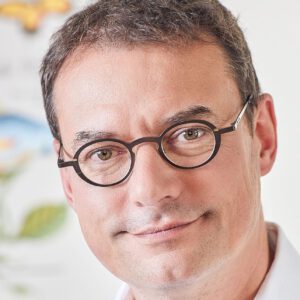
In this edition of "Meet the members", we interview Robert Rusina. He is neurologist and the head of the Center of Neurodegenerative Disorders in the Department of Neurology at Thomayer Teaching Hospital and Third Faculty of Medicine, Charles University in Prague, Czech Republic. In this interview, he provides an insight into his field of research, close clinical-neuropathological correlations among the different subtypes of dementia and his work within ERN-RND and his expactions for the network.
Please briefly introduce yourself and your hospital.
My name is Robert Rusina; I am a neurologist and the head of the Center of Neurodegenerative Disorders in the Department of Neurology at Thomayer Teaching Hospital and Third Faculty of Medicine, Charles University in Prague, Czech Republic.
Question 1: What is your profession (department, affiliation, etc.) and your medical expertise or specific field of interest/why?
My professional focus is cognitive and behavioral neurology, with an emphasis mainly on neurodegenerative dementias, in particular, primary progressive aphasias (PPA), frontotemporal dementia (FTD), and human prion disorders.
My principal research interests are the close clinical-neuropathological correlations among the different subtypes of dementia. Currently, I am the national coordinator of a Czech prospective multicenter research study focusing on primary progressive aphasia.
Question 2: What do you like most about your work and what is the biggest challenge specially in regards to working on rare diseases?
I am fascinated by the clinical heterogeneity of rare neurodegenerative dementias in different patients having the same diagnosis. I am fortunate to have a close, long-standing collaboration with Professor Radoslav Matěj from our hospital’s Institute of Pathology and Molecular Medicine. We have published many correlation studies analyzing various clinical and neuroimaging patterns regarding underlying neuropathological findings, and together we founded the Czech Brain Bank, which is located at our hospital.
The biggest challenge facing me now is the analysis of language patterns and their underlying morphological and structural correlates, which can be unraveled and better understood when language structures and networks are progressively impaired by disease. Cooperating PPA patients are an extraordinary source of information, and close interdisciplinary collaborations among speech therapists, neuropsychologists, as well as linguists, are providing exciting new insights into the deep secrets of human language, communication, and personality.
Question 3: How do you participate in ERN-RND? Can you tell us about your experience presenting a case via the CPMS?
I am one of the coordinators of the FTD disease group. Using CPMS, we have discussed several cases with complex and unusual clinical presentations, and I find these exchanges extremely useful and inspiring – for both the presenters and the consulting experts; of course, the patients are the ones who profit the most from these frameworks.
Question 4: What are your expectations for the network?
In my view, clinical neurology is rapidly moving beyond interactions between patients and physicians supported by neuroimaging and biomarkers. Networking, shared experience, and personal communication between dedicated experts are now the basis for making better diagnostic conclusions and therapeutic options, especially in rare disorders. Ultimately, it also improves our patient-oriented care and the quality of our research facilities.
Moreover, the direct participation of patients and/or caregiver organizations within the ERN-RND disease groups are an uncontestable “bonus.” I also think there is huge potential for ERN-RND-endorsed webinars to promote better understanding and greater expertise in diagnosing and treating rare disorders.
Question 5: How do you think patients and clinicians can work together/why do you think it is important?
Besides the close partnerships between clinicians, patients, and caregivers being essential for good clinical practice in dementia settings, networking supported by ERN-RND may also promote sharing experiences between families with similar problems throughout Europe.
Is there anything else you would like to say?
I believe in the goals of the ERN-RND and strongly support its continued growth and success!
Are you an ERN-RND full member or affiliated partner and would like to participate? Please contact us.
